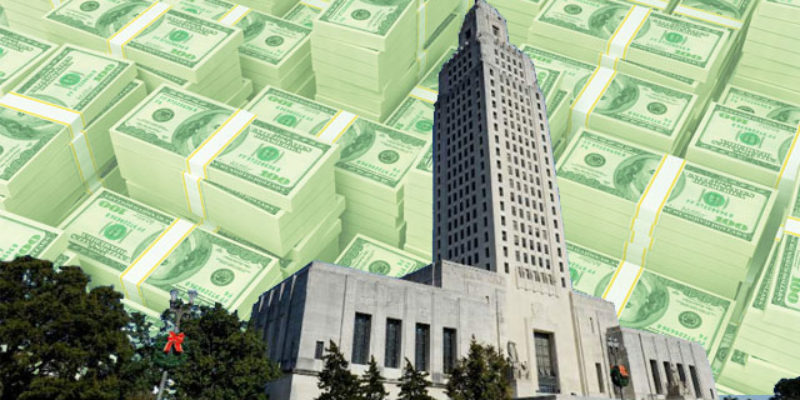Panic is emanating from Baton Rouge around the “fiscal cliff” budget debate.
But don’t buy the hype. While some would like to see state lawmakers return to the capital for a special session in February to consider hiking Louisianans’ taxes yet again, the truth is that politicians don’t need more of your money. And even more to the point, lawmakers don’t need to return for a costly special session, either.
Here’s a recap of where things stand now: The clock is running out on the state’s temporary tax hike, which lawmakers enacted in 2016. But over the past two years, instead of responsibly reining in spending to allow the tax hike to phase out as promised, lawmakers continued spending your money.
The one-penny (or 25%) increase to the sales tax was meant to help the state tread water while politicians got to work on how to right-size government to make it run leaner and more efficiently.
Gov. John Bel Edwards has indicated he’d prefer the legislature impose a regime of taxes worth $1 billion or more in revenue, and he’s stated publicly there is “not a single cut” that he supports making
But those supporting additional tax hikes aren’t giving taxpayers all of the information they need.
Lawmakers have until June 30 to figure out how to fix this problem. And while the old saying goes “the sooner the better,” rushing to adopt a quick fix without the most important information that will end up hurting the state and its residents is the wrong approach entirely.
Louisiana is facing some serious fiscal problems that require thoughtful, responsible action. And along the way, taxpayers deserve to be in the know.
Here is a list of questions that must be answered before lawmakers can finalize a budget or even consider the necessity and timing of a special session:
Advertisement
- What is the actual projected budget gap between anticipated revenue and last year’s expense budget?
- What will the result of federal tax reform be on the state’s tax collection? Estimates have ranged from $200 million to $300 million (or more) in increased revenue, but we don’t yet have a good grasp on that answer.
- What effect will a mix of the embers of a growing state economy (spurred, in part, by the aforementioned federal tax reform) and rising oil prices have on projected state revenue for the coming fiscal year?
- What are the details associated with the taxes the Governor has proposed raising, and what impact will they have on jobs and the economy? There are still no bill authors or fiscal notes assigned to any of the Governor’s December tax proposals.
It’s true, a great deal lies in the balance. Many important decisions will be made, and they should be made as soon as it makes sense to do so. But there’s a difference between rushing and taking decisive action. Sprinting headlong into an ill-advised special session would be a mistake.
It’s unconscionable that any lawmaker would be willing to come back to taxpayers to ask for more money before he or she has done everything possible to prioritize government programs, tighten up excess where possible, and, yes, make some hard decisions about what we can and can’t afford.
The debate over a state’s budget is a proxy for a more fundamental debate over the role of government and its priorities. It’s an important debate, and it should be robust. Lawmakers should not rush into passing taxes in February just to get it over with, and lawmakers owe it to the public to provide an honest accounting of Louisiana’s fiscal status – and what can be done to cut costs.
Daniel J. Erspamer is the CEO of the Pelican Institute for Public Policy, Louisiana’s free-market think tank.
Advertisement
Advertisement

